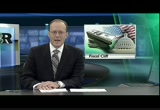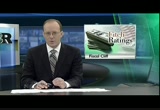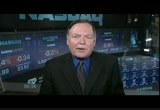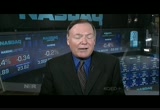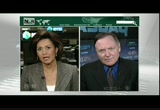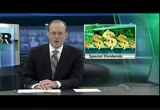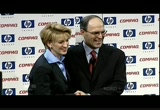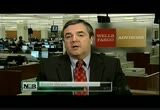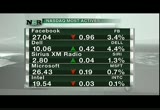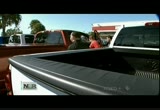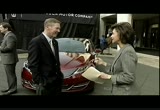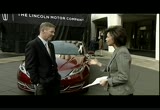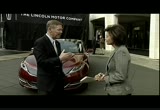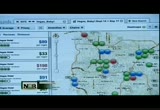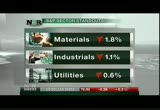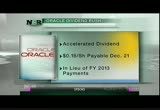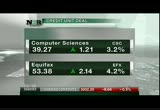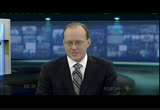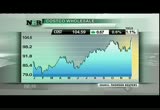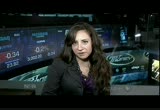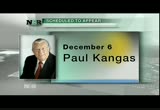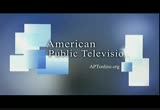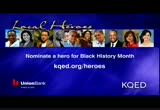tv Nightly Business Report PBS December 3, 2012 6:30pm-7:00pm PST
quote
6:30 pm
>> this is n.b.r. >> susie: good evening. i'm susie gharib. just 28 days to go before the fiscal cliff deadline, today house republicans sent the president a counter-offer, calling for big cuts to entitlement spending, and no new taxes on the wealthy. >> tom: i'm tom hudson. auto sales speed up in november, with buyers taking advantage of ultra-cheap financing to ditch their old cars. >> susie: ford takes the wraps off a new lincoln, taking the brand back to its heritage, but will a re-branding help
6:31 pm
after a weekend of trading accusations over the lack of progress on avoiding the fiscal cliff, both sides now have put their opening offers on the table. last week, it was treasury secretary timothy geithner meeting with top republicans. this afternoon, house speaker john boehner sketched out the g.o.p. proposal in a letter to the white house, and the proposal borrows suggestions from the president's own debt reduction commission, whose plan was ignored last year. the republican letter offered $900 billion in spending cuts from program reforms to medicare and social security. the g.o.p. plan would raise $800 billion in revenues by closing loop-holes and reforming the tax code, but stops short of specifics. noticeably missing: the higher taxes on high-wage earners which president obama has insisted on. the white house responded, saying "the g.o.p. proposal does not meet the test of balance. in fact, it actually promises to lower rates for
6:32 pm
biggest concern for state credit in 2013. saying, "any meaningful federal deficit reduction is likely to lower state funding, forcing program elimination or backfilling." as the tax hikes and spending cuts approach, u.s. manufacturers saw business shrink last month. the institute of supply management's purchasing managers index fell unexpectedly to 49.5, down from 51.7 in october. a reading below 50 means business has fallen back into contraction. the november statistic is the lowest since july 2009. the dow fell 60, the nasdaq down eight, the s&p 500 lost six. >> susie: jeff saut says investors seem to be ignoring bad news, and this is a bullish sign. he's managing director and chief investment strategist at raymond james. so jeff, not only are you bullish but you're also calling for a pretty decent santa claus rally. tell us why?
6:33 pm
>> well, i have learned over the 42 years in this business, susie, that it's pretty tough to put stocks to the downside in the ebullient month of december. i mean it's happened but it's a pretty rare event it just seems to be the holiday sentiment tend to its lift stocks. i think that is what will happen this kror because i'm not one that thinks we'll fall totally off the cliff. >> tell us more. you think there is going to be some kind of deal by the end of the year and that is a good thing for the stock market? >> i am not sure that you will get a whole resolution to the deal but i think will you see some kind of scaled in event of the of the 265 billion of bush tax cuts only 55 billion go to the wealthy. the other 210 billion go to the middle classment i don't think president obama wants to take that away. i can see him taking it away from the wealthy folks. but not the middle class. also, if you read president obama's book you get the sense that he not only wants to leave a legacy, he want to its leave an image of the greatest president of all time.
6:34 pm
and to do that you have to make major breakthroughs. and i lived in d.c. the only way to make major break throughs in d.c. is do what bill clinton did and reach across the table. >> susie: you know, bond the-- beyond the fiscal cliff and i know that say big issue hanging over the markets but there are also fundamentals going on as well. we got mixed reports on the economy. tom just talked about that weak data showing businesses contracting. and we're also getting warnings on weak corporate profits. so doesn't this give you pause about buying in this market right now? >> i think, i just got back from two weeks in europe speaking to portfolio managers in seven different countries. they are profoundly underinvestmented in the u.s. the endowment funds in this country are profoundly underinvested in u.s. equities. a lot of portfolio managers are hoping equities go down as measured by the s&p so their underperformance doesn't look as bad. if the market doesn't go down here i think they will be forced to chase not end of the year.
6:35 pm
>> susie: uh-huh. beyond stocks, give us your thoughts on bonds, on gold, and other commodities. >> i think gold is in a secular bull market. i think it's just been consolidating the big run it has had and will eventually go higher. bons i think with the re-election of president obama it pretty much insurances you will have low-interest rates for the next 18 to 24 months at least on the shored end of the yield curve. but i think bonds you need to have a very specific idea in terms of investing the fixed income side of your asset allocation because i don't know how much below 0 interest rates can go. and if the economy starts to get better, i think interest rates will go up. >> all right. given us a lot to think b jeff, as always, thank you so much. jeff saut, chief investment strategist at raymond james. >> tom: still ahead, tonight's word on the street: "special." with more companies announcing special dividends: just how special are they?
6:36 pm
>> tom: more companies joined the end of year rush today to pay shareholders a one-time "special" dividend or move up 2013 payouts. the actions reward investors with an extra check before tax rates likely increase in 2013. late today oracle accelerated cash payments from next year's second, third, and fourth quarters. hospital operator h.c.a. satellite t.v. company dish network, and women's clothing retailer cato announced special dividends. more than 200 companies have made similar moves in the last month. suzanne pratt reports on whether special dividends are the best use of corporate cash. >> reporter: $1.7 trillion. that's the cash u.s. companies have on their balance sheets. all that hoarding is a sign of the times: nervous companies stockpiling for an economic downturn or whatever else might happen. still, n.y.u. professor april klein says companies are over doing it. >> i know they say you can never be too rich or too thin, but companies can in fact be too rich. and, sometimes you do want to shrink out the cash. >> reporter: that's because too much cash can make a company a
6:37 pm
takeover target. and, with interest rates so low, all that money is just not productive. special dividends are one option for corporate treasurers struggling to spend it. but, what happened to firms investing capital for the future, by hiring new workers, buying other businesses, or on research and development? experts say we won't see that until lawmakers get their act together. >> right now corporate managers are essentially holding their cash waiting for greater policy clarity. and, until greater policy clarity comes, i don't expect to see an real significant deployment of cash whether it be in investment or returning cash to shareholders. >> reporter: and, then, there are share buybacks, which like dividends are popular this year. buybacks are considered a sign management views its stock undervalued. but, some market pros say they return nothing to individual shareholders. >> i'm not a big a big fan of companies using cash to buy back shares.
6:38 pm
it may help on the earnings per share line, and have fewer shares outstanding. i want a company that i own to use that cash to invest in growing that company. >> reporter: and, there are those who still prefer dividends above all else, not the special one-time payouts, but recurring dividends. >> the reason is it's real, it's tangible. and, that when a company is committed to a dividend stream, it tends to make them better managers, it's tends to make them more cash careful when they make acquisitions. >> reporter: one more way to shrink that corporate cash is to pay down debt. but, critics say why do that now when the cost of money is still so cheap. suzanne pratt, "n.b.r.," new york.
6:39 pm
>> susie: american automakers got a bump up in sales in november, thanks to super storm sandy. consumers postponed purchases when the hurricane hit in october, and resumed buying last month. but as diane eastabrook reports, the looming fiscal cliff could cause that sales momentum to lose traction. >> reporter: november turned out to be a good month for the big three and a great month for their foreign competitors. g.m. and ford both saw a modest uptick in vehicle sales last month-- while chrysler got a double digit boost. but competitors from europe and japan blew the domestics doors off. sales at v.w. were up just under 30%. while honda led the japanese pack with a sales increase of just under 40%. the car companies think super storm sandy pushed some sales the last weekend of october into november.
6:40 pm
morningstar auto analyst richard hilgert agrees sandy helped, but the storm wasn't the primary reason november was such a strong month. >> we've got a lot of pent up demand still out there-- pent up demand coming from, especially from the average age of the vehicles being over eleven years at this point in the united states. the average transaction price was up $346 from october because more 2013 models rolled into showrooms without incentives. the wild card this final month of 2012 is the fiscal cliff. analysts say if congress and the white house don't quickly resolve the budget crisis consumers could tighten their belts, throwing a speed bump into what has been an otherwise blockbuster year. diane eastabrook, "n.b.r.," chicago. >> susie: meanwhile, ford is going all out to rev up its upscale lincoln brand. the company is re-naming the division, "the lincoln motor company". it's not a separate company, but a separate brand from ford's
6:41 pm
mainstream models. at an event in new york city's lincoln center, ford introduced the new lincoln mkz sedan, one of four luxury, and fuel efficient models coming out over the next four years. >> no one offers a car that's more fuel he fishant than the this hybrid no one offers a vehicle with the kind of craftsmanship and beautifully skimp find interior that we val. and when you drive it, it's going to be as fun to drive as a bmw but as quiet and comfortable at a lexus. >> susie: this is ford's latest campaign to stage a comeback for lincoln. when i talked to the c.e.o. alan mall ally i asked him if this is his last push to save the brand. >> we haven't focused on lincoln over the last few years because we had these other luxury brands. i think this is almost a beginning because now everybody knows that what ford did with ford, and now they all know ford is going to be 100% laser focused on lincoln. >> susie: when people think
6:42 pm
of a luxury car they think mercedes, bmw, not a lincoln. so how are you going to compete against those upscale brands? >> less than ten years ago lincoln was the number one luxury brand in the united states. and we stopped investing in it because we had all these other brands. so i think we absolutely know how to make a luxury vehicle. we've been doing it for 90 years. so i think when they see the vehicles like the mkz today, you will see a lot of heads turn and a lot of people will consider lincoln because it is a great alternative. >> susie: let's talk about ford's sales in other areas. you reported today some pretty strong sales for november. is that momentum going to continue into 2013? >> i think that it will go very much with the economic growth in the united states. and if the expansion continues and picks up a little bit, i think you'll see the market in general overall grow. but people really do need vehicles. the average age-- average age in the united states is 11 years old. you look at the reliable, fuel of a new vehicle you with replace your older vehicle to you.
6:43 pm
>> what if the fiscal cliff talks goes down what impact will that go on consumer spending. >> if our tax go up and our expenses go up, then we have less discretionary income and 70% of the u.s. economy is driven by the consumers, by us. so that is really important that we absolutely focus on economic growth and don't penalize the consumers going forward. >> so you're saying it would have an impact on your business? >> i think it absolutely would because if our discretionary income is going to be less and we're paying more tax we will have less discretionary income for things like everything. including aublings. >> so what kind of contingency plan is ford making in case we do go over the cliff? >> well, our plan has always been to match our production to the real demand. and we have a very flexible manufacturing system. so you know, if we didn't get this solved and we didn't have as many sales, we would lower our production to meet that real demand like we have in the past. >> looking to the new year, the business environment, consumer sentiment, how are
6:44 pm
things shaping up for ford? >> well, right now it looks like it's going to continue to expand. both in gdp and the industry. based especially on the second half of this year. but again, it is all going to be very dependent on what the economy does and what we do especially in the united states to create an environment where the consumer feels confident and they can purchase these decisions opinions what about europe kux turn those losses into profits. >> we have announced our plan for europe which is similar to what we did in the united states. we will bring more vehicles in to people wanting value and restructuring the operations to get back to profitability but a very, very tough situation in europe economically. >> susie: you said will you step down as c.e.o. in 2014. what do you want to accomplish before you hand over the keys of ford. >> i want to complete the development of this family of vehicles, both for ford and lincoln that are absolutely best in class. and that people really love them and they really value them. and then also restructure the operations that need to be restructured around the
6:45 pm
world. >> tom: apple versus samsung. oracle against google. these are just two recent high- profile court fights over technology patents. but those companies actually use their patents. a cluster of companies make money buying patents, and filing lawsuits to protect them. but here's the thing: suing is all they do with the patents, they don't actually use the technology. sylvia hall reports the practice is getting the attention of regulators. >> reporter: hipmunk is a website that aims to "take the agony out of travel planning." but this year the startup ran
6:46 pm
into some agony of its own-- it was slapped with a lawsuit claiming the company's technology violated a patent dating back to 1994. etsy.com, a popular marketplace for handmade goods, has also been sued by a different company this year based on a patent from 2005. the companies filing the lawsuits aren't competitors. in fact, they don't even use the patented technologies they own. instead, they make money buying up patents and enforcing them in court. they're called non-practicing entities, but critics call them "patent trolls" and say they hurt innovation. >> when firms want to innovate, it's not just a question of coming up with a better product, coming up with a newer invention, but being able to create a fortress to deal with these patent trolls. and that's a cost that is effectively preventing many firms from coming to the market, preventing other firms from being able to expand. the cost on the economy overall and on innovation overall is probably astronomical. >> reporter: studies say the practice costs the economy up to $30 billion each year, and it
6:47 pm
impacts virtually every sector, especially tech and medicine. but supporters of those patent buyers, say the companies are doing more to protect innovation than hurt it. >> it's expensive to get a patent, right, it costs tens of thousands of dollars just to get a patent from the patent office. but then to try to enforce that patent and to monetize it is even more expensive. so what we need is this secondary market, we need people who will come in and say you know what? we will buy your intellectual property. we will support you to invent. >> reporter: supporters worry cracking down on so-called patent trolls would severely hurt the american patent system, and compromise the value of patents, which are often some of the most important assets a company can own. >> the intellectual property should be based on the underlying technology. is this really cool technology, is it promoting the progress of science, is society better off because of that technology. it should not be based on the owner of that particular technology. >> reporter: regulators are holding a workshop next week to
6:48 pm
look at the behavior of these companies. the workshops are expected to shine a light on the controversial practice. sylvia hall, "n.b.r.," washington. >> susie: another major international bank could soon pay up to settle allegations of price-fixing on a key interest rate. swiss bank u.b.s. is expected to settle charges of rigging "libor-rates" as soon as next week with regulators in the u.s. and britain. u.b.s. is not the first bank to settle charges for manipulating the rate that affects everything from credit cards, to state governments. last summer barclays paid almost half a billion dollars. >> tom: the major stock indices were weighed down as u.s. factories reported less business last month. after starting out the session with a small rally, the s&p 500 fell into the red by mid-day. it finished down 0.5%. trading volume was light to begin a new month. 655 million shares on the big board. under 1.7 billion on the nasdaq. economically sensitive sectors saw the heaviest selling. the materials sector fell 1.8%.
6:49 pm
industrials were down 1.1%. and the utility sector shed 0.6% over worries about less power demand with less manufacturing. chemical maker dow chemical was among the weakest in the materials sector as the company held an investor forum today. shares fell 3% on heavier than usual volume. while c.e.o. andrew liveris said they've seen signs of chinese manufacturing picking up in recent weeks, the company continues to plan for slow growth around the world next year. as part of dow's re- organization, the company plans to sell businesses that bring in $1 billion of revenue. competitor dupont also saw selling pressure today, falling 1.7%. this was the biggest percentage loser among stocks in the dow jones industrial average. database software company oracle isn't immune to the dividend gold rush we've seen as companies move to pay shareholders ahead of the new year and the likelihood of higher taxes. but oracle did not declare a special dividend. instead it will pay three quarters worth of pay-outs later this month. it means shareholders will get $0.18 per share, the equivalent
6:50 pm
of three quarters of regular dividends, in one payment. instead of paying the dividends on a regularly schedule quarterly basis next year, and face the possibility of higher taxes, oracle shareholders collect all of them this month instead of next year. shares finished the regular session up by 0.4%, at a two month high. despite accelerating the dividends, the stock was down about the same amount in extended hours trading. oracle said its biggest shareholder, c.e.o. larry ellison did not participate in the dividend decision. figuring out the credit- worthiness of american consumers is the focus of a monday buyout. technology services firm computer sciences is selling its credit information unit to equifax. the price is $1 billion. the business supplies consumer credit information to auto dealers, mortgage companies and even utility providers. the market likes the deal on both sides. the seller, computer sciences saw its stock rise 3.2% to a new 52 week high. the buyer, equifax jumped to an all-time high, rallying 4.2%.
6:51 pm
four of the five most actively traded exchange traded products were lower. the lone gainer was the s&p 500 volatility note, which usually moves in the opposite direction of the broader market. and that's tonight's "market focus." >> tom: when hundreds of companies are doing the same thing, just how "special" can a one-time dividend be? as firm rush to send money to shareholders ahead of the fiscal
6:52 pm
cliff, and threat of higher taxes on dividends, tonight's word on the street is "special." jill malandrino is with the options-profits team at the- street.com. jill, you contend that these special dividends are not so special, why not? >> well, ask yourself are the companies actually creating more share holder value. this cash already exists on the balance sheet and the obvious reason they're doing this is to sort of avoid that fiscal cliff and hurting their shareholders with such high tax implications because for a lot of high earners out there their tax rate could potentially triple. so they want to sort of reward people that are impatient investing with bringing some of these forward or creating special tax dividends. >> tom: but isn't it rewarding shareholders, creating new value but transfering it from the company to the shareholders. look at costco, for instance, announcing a one-time $7 per share dividend. the stock hit new high, even borrowing the money to pay these shareholders. >> well, you have to ask yourself if costco is still
6:53 pm
more of a growth company. they pay 27.5 cents per share each quarter per dividend. this $7 dividend is six plus years of them making dividend payments and they have to access the capital markets to create this special cash dividend. they could have maybe done over things. maybe they didn't have to increase their debt position on the balance sheet. there are other things they could have done such as maybe investing in key areas with growth within the group that they're-- . >> tom: money is about a lot of things and it is about choice, certainly. you make that point here. there is lot ofs speculation about how apple may choose to use its $30 billion in cash in short-term investment it already pays a dividend. could it go the route of auricle and speed up dividend payment or another special dividend, what do you think? >> i think what is interesting with oracle, we stau this happen with an industrial name last week flo where they brought toward their dividend from january 3rd to december 26th. oracle is a special situation because they brought forward three quarters of difficult densd.
6:54 pm
what we need to focus on for 2013 beyond the fiscal cliff, beyond special cash dividend payments ask growing shareholder value. and that could really be a great theme for 2013 as companies look to m & a where. they can put their cash to invest in key growth areas such as analytics and services which are two important areas in the megacap tech space. >> most definitely. big data. we've seen that play out this year, likely to grow next year. do you have any positions if in the stocks we mentioned tonight, jill? >> no, we're restricted. >> tom: our word on the street with jill malandrino with the street.com. >> susie: tomorrow on "n.b.r." we continue our focus on the fiscal cliff, we talk with maya macguineas, of "fix the debt", as her group meets with lawmakers to talk tax and health care reform. also tomorrow, toll brothers reports earnings, and pandora, the internet radio site is also out with quarterly results. and finally tonight, we want to remind you about a special guest on "n.b.r.," later this week.
6:55 pm
"n.b.r." founding co-anchor, paul kangas will join us on thursday night, december 6. we'll talk about the markets, and he'll answer some of your questions. that's thursday, december 6. you can submit your questions on facebook or twitter, at "bizrpt." >> tom, the questions are just flowing in, we have enough to fill a half hour with paul. so i think it's going to be really a lot of fun. >> tom: it will be. lots of questions about stock market technology. one asking paul, will the dow hit 8,000 or 18,000. also some maritime matters, what sailor paul has done throughout his career and a little bit of conversation about the boat business maybe. >> susie: yeah, he served in the coast guard. we have lots to talk with paul about. paul, if you are watching we are looking forward to seeing you. that's nightly business report for monday, december 3. have a great evening everyone, and you too tom. >> tom: goodnight susie, we'll see you online at: www.nbr.com and back here tomorrow night.
6:56 pm
148 Views
Uploaded by TV Archive on

 Live Music Archive
Live Music Archive Librivox Free Audio
Librivox Free Audio Metropolitan Museum
Metropolitan Museum Cleveland Museum of Art
Cleveland Museum of Art Internet Arcade
Internet Arcade Console Living Room
Console Living Room Books to Borrow
Books to Borrow Open Library
Open Library TV News
TV News Understanding 9/11
Understanding 9/11
